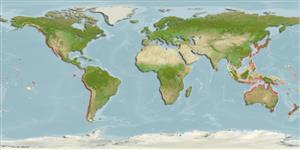Okenia plana Baba, 1960
Flat okenia| Native range | All suitable habitat | Point map | Year 2050 |

|
| This map was computer-generated and has not yet been reviewed. |
| Okenia plana AquaMaps Data sources: GBIF OBIS |
تصوير گوگل |
No photo available for this species.
رده بندی / Names اسامي عام | مترادف | CoL | ITIS | WoRMS
Gastropoda | Nudibranchia | Goniodorididae
Environment: milieu / climate zone / تغييرات عمق / distribution range بوم شناسي
; تغييرات عمق 0 - 12 m (مرجع 79924). Tropical
Distribution كشورها | مناطق سازمان خوار و بار جهاني (FAO) | Ecosystems | ظهور | معرفي
Indo-Pacific. Tropical and temperate climates.
Length at first maturity / Size / Weight / سن
بلوغ: Lm ? range ? - ? cm Max length : 1.0 cm TL جنس نر / بدون خواص جنسي; (مرجع 822)
توصيف مختصر ريخت شناسي
Life cycle and mating behavior بلوغ | تولید مثل | تخم ریزی | Eggs | Fecundity | Larvae
مآخذ اصلی
مراجع | هماهنگ كننده | همكاران
Behrens, D.W. and A. Hermosillo 2005 Eastern Pacific Nudibranchs: A guide to the Opisthobranchs from Alaska to Central America. Sea Challengers. Monterey, CA. 137 p. (مرجع 822)
وضعيت در فهرست قرمز IUCN
(مرجع 130435: Version 2025-1)
وضعيت از نظر سايتس (مرجع 108899)
CMS (مرجع 116361)
خطر برای انسان ها
استفاده انسانی
| FishSource |
ابزارها
اطلاعات بيشتر
تركيب غذايي
مصرف غذايي
شکارچیان
Max. ages / sizes
Length-weight rel.
Length-length rel.
نوسانات طولی
Mass conversion
فراواني
منابع اينترنتي
BHL | BOLD Systems | CISTI | DiscoverLife | FAO(Publication : search) | Fishipedia | GenBank (ژنوم, نوکلئوتيد) | GloBI | Gomexsi | Google Books | Google Scholar | Google | PubMed | Tree of Life | Wikipedia (برو, جستجو) | Zoological Record


